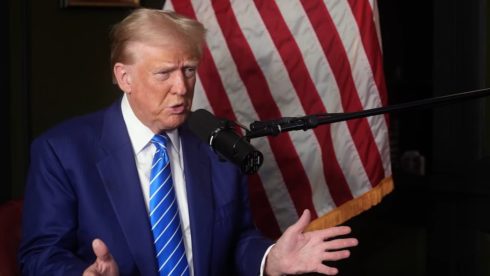Former President Donald Trump has escalated tensions within the Republican Party, urging GOP lawmakers to shut down the government following the failure of a short-term funding bill. The bill, introduced by Speaker Mike Johnson, paired government funding through March 2025 with the controversial SAVE Act, which sought to restrict noncitizen voting in upcoming elections by requiring proof of citizenship. The bill, however, failed on the House floor as Democrats voted against it, and a group of Republican hardliners opposed it for not being fiscally conservative enough.
With the failure of this Continuing Resolution (CR), just 13 days remain before government funding runs out, putting critical federal agencies at risk. Trump, who has remained a dominant voice within the Republican Party, has insisted that the SAVE Act must be part of any future funding package, even if it means halting government operations. Speaker Johnson now faces intense pressure to either negotiate with Democrats on a clean CR without the SAVE Act or risk a government shutdown.
Trump’s Influence on the GOP’s Funding Crisis
Donald Trump has injected himself directly into the ongoing funding crisis, amplifying calls for a government shutdown if the SAVE Act is not included in any new funding bill. The former president, whose influence over Republican lawmakers remains strong, took to his Truth Social platform to rally support for his position, stating, “If Republicans don’t get the SAVE Act, and every ounce of it, they should not agree to a Continuing Resolution in any way, shape, or form.”
Trump’s message highlights his belief that Democrats are registering noncitizens to vote in the 2024 presidential election, a claim that has become central to his push for stricter voting regulations. With his re-election campaign on the horizon, Trump has made the SAVE Act a priority, particularly in his contest against Democratic nominee Vice President Kamala Harris. While many Republicans back Trump’s stance, others within the party are concerned about the political risks of a government shutdown, especially with the 2024 election just months away.
Speaker Mike Johnson’s Challenge in the House
Speaker Mike Johnson, who has had multiple discussions with Trump regarding the funding bill, now faces the challenge of finding a solution that satisfies both the Republican base and more moderate members of the party. The bill’s failure underscores the internal divisions within the GOP, with several Republicans, including Rep. Thomas Massie of Kentucky, opposing the measure for not being fiscally conservative enough. Massie referred to Johnson’s bill as an “undead but doomed zombie,” signaling the strong opposition among hardliners.
With just 220 Republicans in the House and 211 Democrats, Johnson can only afford to lose four GOP votes to secure the passage of any funding bill. The failure of this short-gap bill has left Johnson with few options. He could either pursue a clean CR that excludes the SAVE Act or attempt to negotiate with Democrats for a compromise. However, both paths carry significant political risks, especially with Trump’s continued insistence on tying government funding to voter restrictions.
The Political Stakes of a Government Shutdown
Many Republicans are increasingly worried about the potential fallout from a government shutdown, particularly as the 2024 election approaches. A shutdown would halt funding for essential services, such as Social Security, Medicare, and defense operations, which could negatively impact public perception of the GOP’s ability to govern. Additionally, several Republican lawmakers are concerned that a shutdown could hurt their re-election chances, especially in competitive districts where voters may not support extreme tactics.
Despite these concerns, Trump remains adamant that Republicans should not agree to any funding bill without the SAVE Act, further complicating the situation for Speaker Johnson. The Republican Party now finds itself at a crossroads, needing to balance the demands of its base with the political realities of a looming election. The question remains whether Johnson will be able to unite his party around a new funding strategy or if the GOP will face the consequences of a government shutdown.
What’s Next for the SAVE Act and Government Funding?
With the margin between Republicans and Democrats in the House being so narrow, Johnson must navigate complex political dynamics to pass a funding bill. The speaker is under pressure from both Trump and GOP hardliners to include the SAVE Act in any future CR, but the opposition from Democrats makes it unlikely that such a measure will pass without significant concessions. Johnson’s next move could determine not only the fate of government funding but also the GOP’s standing heading into the 2024 elections.
As the countdown to a potential government shutdown continues, Republicans must decide whether to prioritize Trump’s demands or pursue a more pragmatic solution that avoids political backlash. The SAVE Act has become a flashpoint in this debate, with its supporters arguing that it is necessary to prevent illegal voting and its critics pointing to the financial and political costs of a shutdown. Speaker Johnson’s leadership will be tested in the days ahead as he works to bring his party together and secure government funding.














